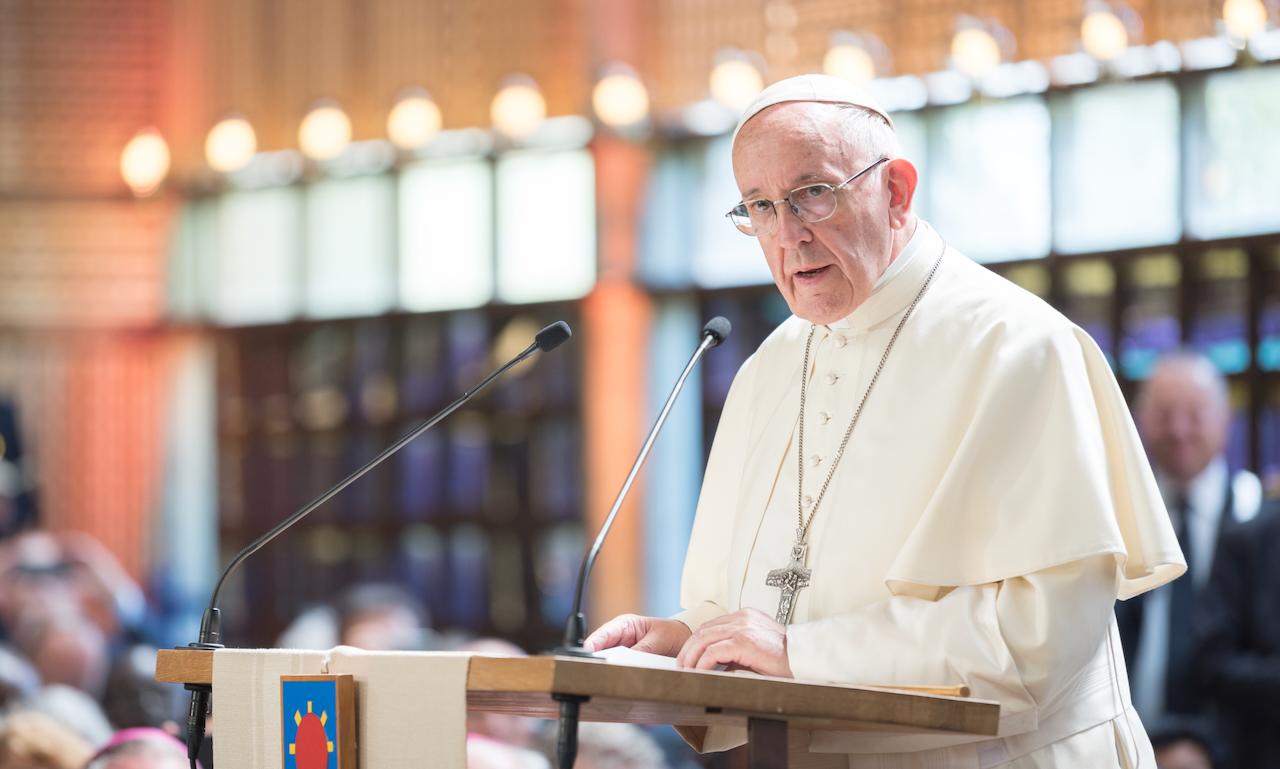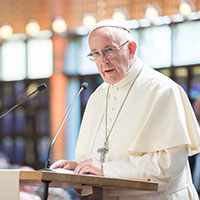The world today learned of the death of Pope Francis, the bishop of Rome and leader of the world’s 1.37 billion Catholics.

Rev. Prof. Dr Jerry Pillay, general secretary of the World Council of Churches (WCC) said, “Pope Francis’s passing will be mourned around the world, not least among his many allies and admirers in the ecumenical movement and in the worldwide fellowship of the WCC. His papacy has been a great gift to the ecumenical movement, and he has been a dedicated collaborator in our efforts toward Christian unity and reconciliation and a prophetic voice for peace, the environment, and justice everywhere.”
The Argentine Jesuit, elected in 2013, leaves deep marks on the Catholic church and Christians worldwide from the chief initiatives and hallmarks of his pontificate: an open-armed embrace of all persons in a “church of the poor, for the poor” that is a “field hospital” for the healing of the sick and vulnerable, a strong and distinctive support of Christian mission as accompaniment of the marginalized, and a ministry of “mercy” or compassion to all.
Francis most notably championed a bold and unrelenting advocacy for addressing climate change and the injustices it spawns, alongside a trenchant critique of global capitalism and economic inequality. Internationally he voiced zealous support of migrants and refugees and trafficked humans, robust communication and collaboration with especially Muslim-Christian fraternal initiatives, and a bold opposition to war, calling all forms of war “a crime against humanity.” Within the Vatican he pursued reform of the Roman curia and Vatican finances, appointment and elevation of bishops from marginalized countries, and appointment of women to the highest tier of Vatican departments.
A dedicated ecumenist
Francis also proved a champion of ecumenical collaboration. He advocated the missional “mandate” of sharing the Gospel ecumenically. He solidified strong working partnerships of the WCC’s chief programmes with their corresponding dicasteries in the Vatican, thus ensuring deep ecumenical collaboration on such issues as ecumenical dialogue, climate justice, interreligious dialogue and cooperation, and advocacy for and service of migrants.
“The ministry and leadership of Pope Francis have been marked by an ecumenical openness and eager cooperation from the start,” said Bishop Dr Heinrich Bedford-Strohm, moderator of the WCC central committee. “At their heart stand the gospel, the presence of Christ and the Spirit in the church, and the imperative of compassion and mercy toward all our sisters and brothers. He understood his mission not as a guardian of abstract truth claims but as an enabler and opener of relationship. In this he himself radiated the love of Jesus Christ that he preached. In my many encounters with him I always felt the ‘ecumenism of the heart’ of which the WCC assembly in Karlsruhe 2022 spoke in its unity document. In his strong commitment to refugees and other vulnerable groups, he was a true witness of this love of Christ. We share that deep faith, we are inspired by his witness, and in his memory we pledge to continue our work of faith active in justice, reconciliation, and unity.”
In 2016, Pope Francis visited Lund, Sweden, to participate in a Catholic-Lutheran commemoration of the 500th anniversary of the Protestant Reformation. This was the first time a Roman Catholic leader had met with representatives of the Lutheran World Federation to mark the Reformation.
Francis’s commitment to ecumenical collaboration and mission were further highlighted by his extraordinary and joyful pilgrimage to the WCC, the Ecumenical Centre, and the Ecumenical Institute at Bossey in 2018.
Celebrating the WCC’s 70th anniversary and its ecumenical charism, the pope said there, “We are heirs to the faith, charity and hope of all those who, by the nonviolent power of the Gospel, found the courage to change the course of history, a history that had led us to mutual distrust and estrangement, and thus contributed to the infernal spiral of continual fragmentation. Thanks to the Holy Spirit, who inspires and guides the journey of ecumenism, the direction has changed and a path both old and new has been irrevocably paved: the path of a reconciled communion aimed at the visible manifestation of the fraternity that even now unites believers.”
Collaborative ministries and diaconal service were Francis’s chosen form of ecumenism, uniting churches as agents of reconciliation in the world. As he said in his presentation to the WCC in 2018, “So let us ask ourselves: What can we do together? If a particular form of service is possible, why not plan and carry it out together, and thus start to experience a more intense fraternity in the exercise of concrete charity?”
21 June 2018, Geneva, Switzerland: On 21 June 2018, the World Council of Churches receives a visit from Pope Francis of the Roman Catholic Church. Held under the theme of “Ecumenical Pilgrimage – Walking, Praying and Working Together”, the landmark visit is a centrepiece of the ecumenical commemoration of the WCC’s 70th anniversary. The visit is only the third by a pope, and the first time that such an occasion was dedicated to visiting the WCC. Here, an ecumenical prayer service with religious leaders from all over the world.

